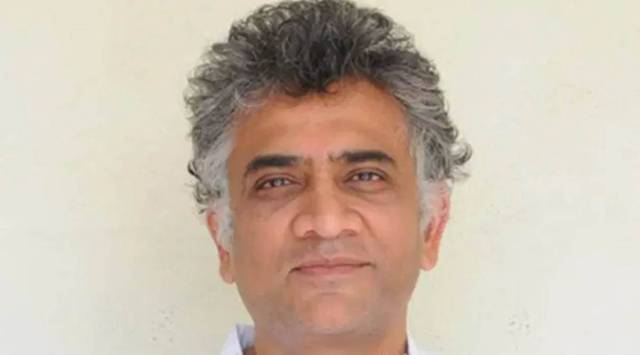Court asks CBI to withdraw LOC against ex-Amnesty chief Aakar Patel
The court also said that the LOC was issued based on "wrong interpretation and understanding of the law", and cautioned CBI that the agency’s power to "investigate and prosecute is not an unbridled power”.
 Amnesty International chair Aakar Patel (File)
Amnesty International chair Aakar Patel (File)A Special court has upheld a trial court’s order asking the CBI to withdraw a Look Out Circular (LOC) issued against former Amnesty International India chief Aakar Patel, noting that the LOC issued was based on “wrong interpretation and understanding of the law”, and cautioned the agency by stating that the power of the CBI to “investigate and prosecute is not an unbridled power”.
Special Judge Santosh Snehi Mann in an order passed on Saturday also set aside the trial court’s order asking the CBI director to issue an apology to Patel. The CBI had issued the LOC in connection with a case registered against Amnesty International India in 2019 under the Foreign Contribution (Regulation) Act. At the time, Patel headed the organisation.
🗞️ Subscribe Now: Get Express Premium to access the best Election reporting and analysis 🗞️
Patel was stopped twice from leaving the country as he was due to travel to the US to give lectures at various Universities. Justice Mann has asked Patel to appear before a trial court and furnish a bond for his appearance and asked him not to leave the country without the permission of the trial court.
The judge also said that the “manner in which the LOC has been issued shows lack of understanding of the relevant law, and hence need for orientation of the concerned officers of the CBI, not only sensitisation but also to bring the objectivity in the actions is not out of context”.
“LOC issued against the respondent is bad in law, hence cannot be sustained. Order of the trial court quashing/setting aside the LOC does not suffer from any infirmity and is a well reasoned order based on the principles of law,” the court said.
It, however, emphasized, “Though a balance should have been struck qua the prosecuting agency that the respondent accused may flee from the country and the fundamental right of the respondent accused to travel abroad, by putting conditions taking recourse to section 88 CrPC which empowers the trial court to take bond for appearance.”
The judge said that the observations of the trial court are “not of the nature of exercising power of superintendence, they are out of concern and the petitioner (CBI) is expected to take them in the right spirit.”
It said that the power of the CBI to “investigate and prosecute is not an unbridled power.”
“In glaring cases of excesses committed in actions, there may arise the need for fixing accountability. In the present case, LOC was issued on wrong interpretation and understanding of law, and not out in malice or ill will. Hence it is not a fit case to call for fixing the accountability for issuance of LOC,” the court said.
Dealing with the directions of the trial court to the CBI director to tender a written apology and its general observations on monetary compensation, the judge said that “it is a settled legal proposition that trial court can step in to compensate for police excesses and illegal actions of the State when fundamental rights are violated.”
On the trial court’s order that Patel can approach the appropriate forum to seek monetary compensation, the judge said was not out of context though whether Patel would get that compensation was a subject matter of trial before the court of competent jurisdiction.
The trial court had relied upon a judgment titled Prempal Singh while asking the CBI director to apologise. In this case, a court had found that an accused was falsely implicated in a rape case for which the police officers were asked to tender apology after the judgment was passed.
Justice Mann noted that this ruling was passed after finality had been attained in the case and hence this judgment could not be applied in the trial court’s order.
The trial court had discussed the mental harassment that was caused to Patel because of the CBI issuing the LOC, the judge ruled that since determination of compensation was not a subject matter before the trial court, hence there was “no scope to venture into this aspect.”
The court said that Patel had joined investigation, whenever called and it is not the case of the CBI that the accused in any manner either tried to hamper the investigation or tamper with the evidence.
It noted that the investigation in this case was complete and a chargesheet was filed which was at the stage of consideration and circumstances warranting the opening of a LOC can only arise if the accused does not appear before the trial court despite issuing non bailable warrants or other coercive measures.
The CBI had argued that they issued the LOC considering that Patel was an influential person and well connected with entities outside India because of which he may evade the process of law and flee. On this the court held this submission has “no force in law to support and sustain.”
“Subjective satisfaction of the IO to assess the situation for issuance of LOC must flow from the objective criteria laid down in the law,” the order read.
The court said that this apprehension of the CBI that the accused will not appear before the trial court “could have been very well addressed by taking recourse to section 170 CrPC (Cases to be sent to Magistrate, when evidence is sufficient).” It said that under this provision the accused could have been presented before the trial court while filing the chargesheet.







